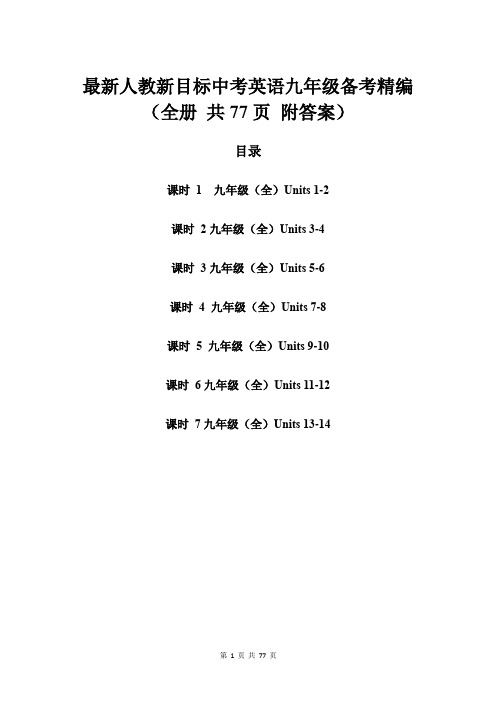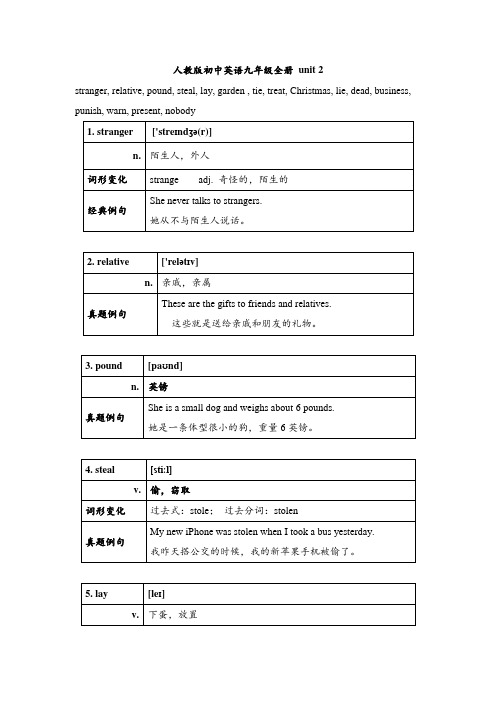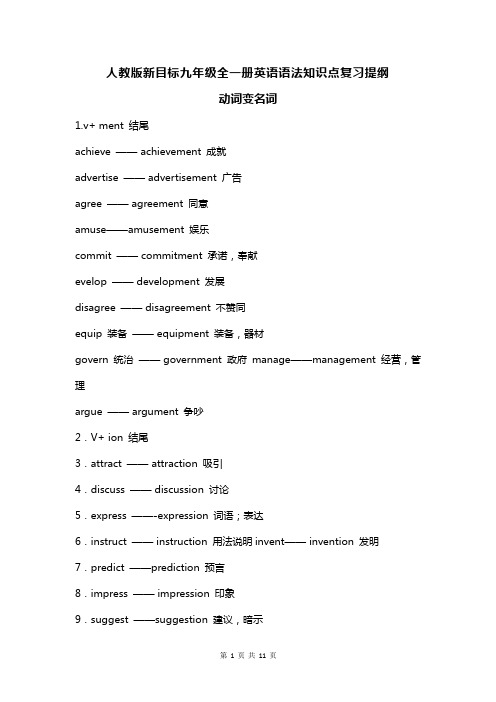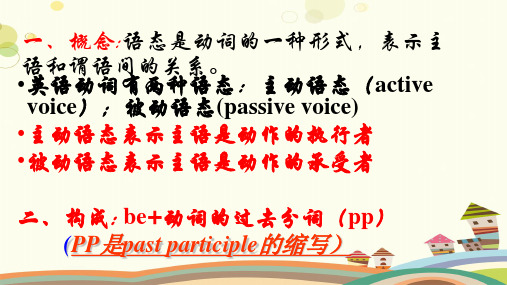新目标中考英语九年级全册知识点
最新人教新目标中考英语九年级备考精编(全册 共77页 附答案)

最新人教新目标中考英语九年级备考精编(全册共77页附答案)目录课时 1 九年级(全)Units 1-2课时2九年级(全)Units 3-4课时3九年级(全)Units 5-6课时 4 九年级(全)Units 7-8课时 5 九年级(全)Units 9-10课时6九年级(全)Units 11-12课时7九年级(全)Units 13-14课时 1 九年级(全)Units 1-2Ⅰ.语法与情景对话1.—Hi, Amy, you live on Center Street. Can you tell me _______?—Sure. There is one called Grandma's Home.A. where it isB. how I can get thereC. if there is a restaurant on itD. what it is2.[2017海南改编]Mr. Zhao is going to the airport _______ taxi.A. inB. onC. byD. at3.[2017鄂州]—The dishes in this restaurant must be very expensive.—Don't worry. You can enjoy yourself. It's my _______.A. timeB. treatC. taskD. taste4.[2017襄阳]—What's your _______ to English learning, Lin Tao?—I think watching English movies is helpful.A. placeB. ageC. timeD. secret5.[2017长春]_______ Chinese culture, many college students go to foreign countries every year.A. SpreadingB. To spreadC. SpreadsD. Spread6.[2017西宁]His grandmother _______ for 6 years. And he still misses her very much.A. diedB. has diedC. has been deadD. has been died7.[2017天津]We had a football match yesterday. Our fans cheered us on _______ and we felt more confident.A. slowlyB. loudlyC. nearlyD. carelessly8.[2017天水]—Home is _______ wherever you go.—East or west, home is the best.A. warmB. warmerC. warmestD. the warmest9.[2017新疆]The headmaster warns us _______ the school rules, or we'll be punished.A. to breakB. not to breakC. breakingD. don't break10.[2017鄂州]—If you do that, you will _______ with an egg on your face.—But I won't regret it.A. take upB. end upC. keep upD. catch upⅡ.完形填空The Spring Festival is one of the most important festivals in China. During the Festival, Chinese people have many activities. They paste up Spring Festival couples (春联), greeting the New Year and saying 1 to the old year. On the first day of the Spring Festival, people 2 , wearing new clothes. Nowadays, children get 3 pockets from their parents and their relatives by web chat. It is a good time for people to visit relatives and friends. More importantly, the Spring Festival is celebrated not only in China but also in 4 parts of the world.The Spring Festival was 5 in the UK from 1980. Every new year, people also get together and have lots of activities. They sing songs, dance 6 music, share photos with friends or watch 7 in the cinema. Additionally, the Spring Festival has become a key time for Chinese living in the US. They 8 in a large evening party to welcome the traditional new year. The Chinese New Year will be welcomed with three weeks of celebrations across Australia. Thousands of people come to Sydney's Chinatown. They enjoy fireworks (鞭炮) and lion dances. The family dinner on New Year's Eve is an important tradition for Chinese 9 they were born in Singapore or moved there from China. They usually hold it at 10 because having it in a restaurant takes away the meaning of the tradition.1.A. yes B. goodbye C. no D. hi2.A. hang up B. hang back C. hang out D. hang on3.A. green B. golden C. red D. yellow4.A. other B. others C. another D. one5.A. congratulated B. celebrated C. happened D. built6.A. on B. in C. to D. under7.A. TV B. matches C. movies D. games8.A. put B. join C. live D. take9.A. if B. weather C. whether D. which10.A. home B. outdoors C. restaurant D. hotelⅢ.阅读理解In Britain, Boxing Day is usually celebrated on December 26th, which is the following day after Christmas Day. However, strictly speaking, Boxing Day is the first weekday after Christmas.Like Christmas Day, Boxing Day is a public holiday. This means it's a non-working day in the whole of Britain. When Boxing Day falls on a Saturday or Sunday, the following Monday is the public holiday.The exact origin (起源) of the holiday is unclear. One of the thoughts is that during the Middle Ages, when great sailing ships were setting off to discover new land, a Christmas Box was placed by a priest (神父) on each ship. Those sailors who wanted to ensure a safe return would drop money into the box. It was sealed up and kept on board until the ship came home safely. Then the box was handed over to the priest in the exchange for the saying of a Mass of thanks for the success of the sailing. The priest wouldn't open it to share the contents with the poor until Christmas.One more thought is about the“Alms Box”placed in every church on Christmas Day. Worshippers (做礼拜的人) put gifts for the poor into it. These boxes were always opened the day after Christmas, that is why that day became known as Boxing Day.Today, many businesses, organizations and families try to keep the traditional spirit of Boxing Day alive by donating (捐赠) their time, services and money to aid Food Banks, providing gifts for the poor, or helping families in need. Besides, spending time with family and shopping are popular Boxing Day activities now.1.If Christmas Day is on a Saturday, Boxing Day will be celebrated on _______.A. December 25thB. December 26thC. December 27thD. December 28th2. Sailors dropped money into the Christmas Box in order to _______.A. save the poorB. pay for the priestC. discover new landD. pray for sailing safety3. What does the underlined phrase “sealed up” mean?A. 密封B. 悬挂C. 归还D. 传递4. The following activities can show the traditional spirit of Boxing Day EXCEPT _______.A. offering gifts to the poorB. supporting families in needC. spending time with familyD. giving money to aid Food Banks5. The purpose of the passage is _______.A. to praise the kindness of priestsB. to introduce the origins of Boxing DayC. to call on people to help the poorD. to compare Boxing Day with Christmas DayⅣ.任务型完形填空One day, a blind man John and his guide dog arrived at a hotel. There were many 1. _______ in the hotel. “Good evening, sir,” the 2. _______ said, “You are welcome to stay, but I'm sorry that pets are not 3. _______ to live here.” “He isn't a pet. He's my eyes. I'm blind and I can't go anywhere by 4. _______.”The waiter realized it was a guide dog. So he said sorry and then led John and his dog to their room on the 5. _______ floor.After a busy day, John was very tired and soon fell asleep. A few hours 6. _______, his dog started barking(吠)loudly. John woke up and 7. _______ smoke. A fire! He must do something to stop the smoke coming in. With the 8. _______ help, John got down to the floor next to the dog and waited for the fireman to come.Soon he heard the sound of a fire engine(消防车). A fireman got him out of the building, but the fireman didn't 9. _______ to waste time on the dog. John would not go without his dog.10._______, the fireman got the dog out of the building and they were both safe.Ⅴ.任务型阅读理解[2017十堰改编]The Double Ninth Festival (重阳节) is a special day for older people in China. On this holiday, younger people usually show love and respect for older people.③Respecting older people is a tradition in China. There are many ways in which Chinese people express their respect. When an older person ①_______ a room, everyone stands up. People are introduced from the oldest to the youngest. When we present a book to an older person, two hands are used. Young people always offer their seats to older people on a crowded subway or bus.In western countries, however, older people seldom think they are old. They are called “seniors” instead of “old people”. They'd rather do everything themselve s. Even after retirement (退休), they take on hobbies, part-time jobs and new activities to keep their bodies working well.Westerners respect their older people, too. ②Seniors don't need to pay when they take trains or buses. They are given discounts (折扣)in stores and restaurants.But western seniors don't often live with their children—they live alone. For holidays, the family usually gather at the grandparents' homes. A great smile and a warm hug for their parents are enough for children to show their respect.1.根据短文内容,在文中①处填入恰当的词。
人教新目标版九年级英语全册中考考纲词汇详解:Unit 2 I think that mooncakes are delicious!

如果你感觉不舒服,就躺下休息吧。
11.dead
[ded]
adj.
死的,无生命的
词形变化
die v.死,去世
death n.死亡
dying adj.将死的,奄奄一息的
常考短语
be dead去世
真题例句
Our friendship was so dead that I didn’t call him even if I went home.
这些就是送给亲戚和朋友的礼物。
3. pound
[paʊnd]
n.
英镑
真题例句
She is a small dog and weighs about 6 pounds.
她是一条体型很小的狗,重量6英镑。
4. steal
[stiːl]
v.
偷,窃取
词形变化
过去式:stole;过去分词:stolen
真题例句
领带,领结
真题例句
It’s a wise choice to wear the white tie. It matches your shirt well.
戴这个白色领带是个明智的选择,它很搭配你的衬衫。
8. treat
[triːt]
v.
对待,治疗,请客
习惯用语
trick or treat不请客就捣蛋
你可以把钥匙放在桌子上。
6. garden
['ɡɑːdn]
n.
花园
常考短语
in the garden在花园里
真题例句
Mike was reading in the garden when his mother came.
人教版新目标九年级英语初三英语中考语法复习归纳知识点专题12 句子的种类(解析版)

备战中考系列:英语2年中考1年模拟专题12 句子的种类☞解读考点直击考点句子种类:简单句、并列句、复合句1. 简单句:①:S+Vi (此时动词为不及物动词,后面不能带宾语)②: S+Vt+O (此时动词为及物动词,后面要带宾语)③: S+Vt+O+OC (此时宾语不完整,需要一个不足语来补充说明宾语)④: S+link verb+P (此时句子中没有具体的动作,只有状态)⑤: S+Vt+InO+O (此时句子中有两个宾语即表示人的间接宾语与表示物的直接宾语)2. 并列句:简单句+并列连词(and, or, but, so)+简单句3. 复合句:①:主句+连接词+宾语从句②:主句+连接词+定语从句③:主句+连接词+状语从句【名师点睛】一、五大基本句型结构1.主语加系动词加表语The bike is new.这辆自行车是新的。
The hat looks nice on you!(系动词还有feel,taste,smell,sound) 你戴这顶帽子真好看。
2.主语加不及物动词He swims in the river every summer.他每年夏天都在这条河里游泳。
3.主语加及物动词+宾语Children often sing this song.孩子们经常唱这首歌。
4.主语加及物动词加间接宾语加直接宾语She showed her friends all her pictures. 等于She showed all her pictures to her friends.她向她的朋友们展示了她所有的图画。
5.主语加及物动词加宾语加宾语补足语We keep our classroom clean and tidy.我们保持教室干净整洁。
二.疑问句分类及用法见下表:分类概念形式一般疑问句用yes和no来回答的疑问句叫做一般疑问句be加主语加其他?情态动词加主语加动词原形加其他?助动词加主语加动词原形/过去分词加其他?如:—Is she from England? 她来自英格兰吗?—Yes, she is. 是的,她是。
0871_人教新目标中考英语一轮复习素材:重难点突破专题 九全Units 1-2.doc_0

九年级(全)Units1—2by(九全册Unit1P1)【举例透析】①Last weekend,my parents went to London by air.上周末,我的父母乘飞机去了伦敦。
(by+交通工具,表示“通过……;乘……;由……”。
)②Students should go to bed by22:30at night.学生们应该在晚上十点半之前上床睡觉。
(by+时间名词,意为“在……之前”。
)③She was drinking orange juice by the swimming pool.她正在游泳池边喝橙汁。
(by+地点名词,意为“在……旁边”,相当于beside。
)④The book named Old Man and the Sea was written by Hemingway.《老人与海》这本书是海明威写的。
At last,we found out that the window was broken by Tom.最后,我们发现窗户是汤姆打破的。
(用于被动语态,意为“被;由”,引出动作发出者。
)⑤I study English by listening to tapes.我通过听磁带来学习英语。
(by+doing__sth.意为“通过……方式或途径做某事”,对by引导的方式状语提问用how。
)⑥其他短语:by oneself独自;by mistake无意地;by accident偶然地;by the end of到……末为止(C)1.We can save money______cooking our own meals instead of eating outside.A.withB.toC.byD.in(A)2.(咸宁中考改编)—President Xi Jinping paid an important visit to the US in2017.—And he was warmly welcomed______Donald Trump,the45th American president.A.byB.fromC.toD.with3.在我们学校,如果你在晚上九点半之前没有回到寝室,你会受到惩罚的。
人教版新目标九年级全一册英语语法知识点复习提纲

人教版新目标九年级全一册英语语法知识点复习提纲动词变名词1.v+ ment 结尾achieve —— achievement 成就advertise —— advertisement 广告agree —— agreement 同意amuse——amusement 娱乐commit —— commitment 承诺,奉献evelop —— development 发展disagree —— disagreement 不赞同equip 装备—— equipment 装备,器材govern 统治—— government 政府manage——management 经营,管理argue —— argument 争吵2.V+ ion 结尾3.attract —— attraction 吸引4.discuss —— discussion 讨论5.express ——-expression 词语;表达6.instruct —— instruction 用法说明invent—— invention 发明7.predict ——prediction 预言8.impress —— impression 印象9.suggest ——suggestion 建议,暗示10.educate —— education 教育11.graduate —— graduation 毕业12.operate —— operation 操作,动手术13.illustrate —— illustration 阐明,举例说明14.pollute —— pollution 污染15.introduce ——introduction 介绍16.organize ——organization组织17.imagine —— imagination 想象力18.inspire——inspiration 灵感,鼓舞人心的事19.invite —— invitation 邀请20.compete —— competition 竞争,比赛21.pronounce ——pronunciation发音22.admit —— admission 承认23.permit —— permission 允许24.conclude —— conclusion 结论25.decide —— decision 决定26.describe —— description描写,描绘27.resolve —— resolution 决心28.solve ——solution 解决方法3.V+ ance 结尾\1.allow —— allowance 允许2.appear —— appearance 外貌,出现3.perform —— performance 演出4.exist —— existence 存在5.V+ ing 结尾1.end —— ending 结尾,结局2.train ——training训练3.mean —— meaning 意义4.say—— saying 谚语5.remind —— reminding提醒6. bathe ——bathing沐浴6.词尾加-er或-or后变成表示“某一类人”的名词work——worker 工人7.teach——teacher老师8.sing——singer 歌手9.jump——jumper跳高运动员10.play——player表演者、运动员11.learn——learner 学习者12.visit——visitor访问者13.invent——inventor发明家7.V+ 其他8.beg——beggar 乞丐9.sit——seat 座位10.believe —— belief 信仰11.behave —— behavior 行为12.know—— knowledge 知识13.fly—— flight 飞行14.mix —— mixture 混合物15.press —— pressure 压力16.serve —— service 服务17.succeed ——success 成功18.pursue —— pursuit 追求,从事19.propose —— proposal 建议20.withdraw ——withdrawal 取钱;收回;撤退21.survive —— survival--survivor 幸存者22.arrive —— arrival到达23.analyze —— analysis 分析 2形容词变名词 1.词尾ent改为ency或ence24.efficient有效率的——efficiency 效率patient——patience/impatience 耐性/无耐心dependent——dependence依赖性independent——independence 独立性urgent——urgency 紧急25.2.ble结尾,ble改为bility26.possible—possibility 可能27.responsible—responsibility 责任;职责3.其他accurate—accuracy 准确性28.prosperous——prosperity 繁荣29.true——truth 真相30.wide——width 宽度31.long——length 长度32.high——height 高度 3名词/动词变形容词1.名词+y33.guilt 罪恶——guilty 内疚的34.health——healthy 健康的35.luck——lucky 幸运的36.cloud——cloudy 多云的37.wind—windy 多风的38.rain——rainy 多雨的39.snow——snowy 多雪的40.tourist —— touristy 游客多的er结尾,改er为ry hunger——hungry 饥饿的anger —— angry 生气的fog—— foggy 有雾的sun—— sunny 阳关灿烂的fur—— furry 毛皮的shine——shiny 发亮的taste —— tasty 美味的2.名词/动词+ ed以辅音+辅音结尾的单词,直接加edtalent —— talented 有天赋的offend ——offended 生气的crowd ——crowded 拥挤的以元音字母e结尾的单词直接加dbalance —— balanced 平衡的organize——organized 有组织的pollute ——polluted 被污染的please ——pleased 高兴的元音加辅音结尾的单词,词尾辅音双写再加edspot —— spotted 有斑点的3.名词+ ful/lesscare —— careful/ careless 小心的/ 粗心的help—— helpful / helpless 有帮助的/ 无助的use—— useful/ useless有用的/ 无用的meaning —— meaningful / meaningless有意义的/无意义的colour—— colourful /colourless多彩的/无色的pain 疼痛——painful /painless痛苦的/ 不痛的thank—— thankful / thankless 充满感激的/ 不知感恩的 peace 和平—— peaceful 和平的play游戏—— playful 爱玩耍的home —— homeless 无家可归的4.名词/动词+ able5.change —changeable 易变的6.adjust——adjustable 可调整的knowledge——knowledgeable 知识渊博的comfort—comfortable舒适的7.suit ——suitable 合适的动词以辅音加y结尾把y变i 加able ,deny—— deniable 可否认的rely—— reliable 可靠的4.名词+ ouscourage——courageous 勇敢的danger—— dangerous 危险的以y结尾,改y为i再加ousmystery 神秘—— mysterious 神秘的5.ce 变tconfidence—— confident 自信的difference——different 不同的6.dependence —— dependent 依赖他人的independence—— independent 独立的7.词尾加 aladdition—— additional 附加的,额外的music—— musical 音乐的person——personal (私人的)nation—— national 国家的education——educational有教育意义的tradition—— traditional 传统的origin起源——original 新颖的;独创的以元音字母e 结尾的单词,去掉词尾元音加al nature——natural 自然的globe—— global 全球的特例:class—— classical 经典的medicine 药——medical 医学的grammar—— grammatical 语法的8.名词+ lyfriend—— friendly 友好的live——lively 活跃的,有生气的love——lovely 可爱的week——weekly 每周的man——manly 男子气概的;强壮的9.词尾+ en10.wood—— wooden 木制的11.wool—— woolen 羊毛的10.表示方位的词11.East——eastern12.West——western13.outh——southern14.North——northern15.11.四大洲Asia 亚洲—— AsianAfrica 非洲——AfricanEurope欧洲—— EuropeanAmerica 美洲——American12.其他13.energy精力——energetic 精力充沛的strategy——strategic 战略的scientist——scientific 科学的fool 傻子——foolish 愚蠢的love——loving 慈爱的pleasure——pleasant令人愉快的/ pleased高兴的pride——proud 自豪的 4形容词变动词1.词尾加izemodern——modernize 使...现代化social——socialize 使...社会化2.词尾加enfast——fasten 使固定;集中于short—— shorten 缩短wide——widen 放宽less——lessen 使...减少特例(有变形):long——lengthen 使延长strong ——strengthen 加强;巩固3.词前加enlarge ——enlarge 扩大;放大 5形容词变副词1.形容词+ ly bad——badly 坏地bright——brightly 明亮地casual——casually 随意地cl ear——clearly 清楚地complete——completely 完全correct——correctly 正确地final——finally 最后fortunate——fortunately幸运地general——generally 一般来讲loud——loudly 大声地particular ——particularly特别地polite——politely 礼貌地proper ——properly适当地main——mainly 主要地most ——mostly 多半,大多数normal——normally 正常地quick——quickly 迅速地quiet——quietly 轻轻地,安静地real——really 真正地recent ——recently 最近;近来sad——sadly 悲哀地slow——slowly 缓慢地special——specially 专门,特殊地specific——specifically 特定地,明确地strong——strongly 坚决地,强烈地sudden——suddenly突然usual——usually 通常2.以le 结尾的,去e + yfortable——comfortably 舒服地gentle——gently 温柔地possible——possibly 可能地simple——simply 仅仅;只;简单地terrible——terribly 非常;极度地4.辅音字母+ y 变y为 ily5.easy——easily 容易地6.heavy——heavily 沉重地7.happy——happily 快乐地4.特殊good——well好地true——truly 真实地第11页共11页。
英语人教新目标九年级全一册人教版九年级Unit5被动语态(共32张PPT)

•10.带双宾语的动词可有两种被动语态 ask/ tell/pay /send /give /buy/ show/ offer/ lend /make/ teach/ serve... Eg:She asked him some questions. •He was asked some questions by her. •Some questions were asked him by her. Eg: Mother bought me a new coat . •I was bought a new coat by mother. •A new coat was bought for me by mother.
•eg:I often see him run on the playground.
She often hears someone sing there. He is often seen to run on the playground by mSeo.meone is often heard to sing there by her.
什么时候要用被动语态呢? 在下列三种情况之一要用被动语态: ①不知道动作的执行者是谁,用被动语态。
His bike was stolen last week. ②没有必要指出谁是动作的执行者,用被动语态。 Rice is grown in the south of China. ③需要强调动作的承受者时,用被动语态.
•2. take place/ happen(发生,无被动语态) Eg: Great changesh_a_v_e__t_a_k_e_n_p_l_a(cteake place) in my hometown in the past few years.
初中新目标英语中考总复习英语版动词+doing和+to do
初中新目标英语中考总复习英语版动词+to do 和动词+doing 句型总结一、带动词ing形式1.keep doing2.keep sb. Doing3.practise doing sth.4.enjoy doing5.finish doing6.be afraid of doing7.be busy doing8.look forward to doing9.how about doing、./what about doing10.spend some time (in)doing11.spend some money (in) buying12.feel like doing13.stop/keep/prevent … from doing14.thank sb for doing15.thanks for doing16.dosomecooking/cleaning/reading/shopping/washing 17.goswimming/fishing/shopping/skating/boating18.mind doing19.can’t help doing20.consider doing21.have fun doing sthhave difficulty doing sthhave trouble doing sthhave problem doing sth22.waste time/money doing23.instead of doing 24.miss doing25.hold on to doing26.pay attention to doing27.suggest doing28.It’s time for doing29.There is sb doing sth30.be used to doing sth31.be used for doing sth32. have a lot of experience33. sb allow doing sth34. put off doing sth35. succeed in doing sth36. end up doing37. give up doing38.二.含有不带to的动词不定式句型:1.had better (not) do sth.2.would you please (not) do sth3.why not do sth.4.why don’t you do sth.5.Shall we do sth.?6.let sb do sth.7.make sb. do sth. have sb do sth8.feel sb do sth三、含有带to的动词不定式句型:1.It’s time to do sth.2.It takes sb. some time to do sth3.tell/ ask/ want/encourage/invite/ sb. todo sth.4.Would you like to do sth.?5.It’s good/bad to do sth6.It’s good/bad for sb.to do sth.7.be +adj.+ enough to do sth.8.sb. is ready to do sth.9.It’s + adj.+ for sb. to do sth.10.It’s + adj.+ of sb. to do sth11.would like/love /decide/want/wish/to dosth.12.would like/love sb. to do sth.13.Prefer to do sth. rather than do sth.14.how/ when/where/whether to do sth15.can’t wait to do16.too … to do …17.be afraid /ready/able/sure to do18.It’s time to do sth19.My job is to do sth20.My dream is to do sth21.My hobby is to do sth22.refuse to do sth23.warn sb to do sth24.pretend to do sth25..teach/learn to do sth26.need to do sth27.be willing to do sth28..try to do sth29.try one’s best to do sth30.agree to do sth31.seem to do sth32.plan to do sth /make a plan to do sth33.in order to do sth34.have a chance to do sth35.find it +adj + for sb to do sth36.have sth to do37.There is sth for sb to do38.be anxious to do39.afford to do sth40.两个动作连用,表目的ed to do sth42.be used to do sth43.be supposed to do sth44.allow sb to do sth45.sb be allowed to do sth46.the best way is to do sth47.the next step is to do sth48.have nothing to do with49.the first thing is to do sth50.it’s best to do sth51.it’s a good time to do sth52.it is a good way to do sth53.add to do54.urge sb to docate sb to do56.wait for sb to do57.order sb to do58.happen to do sth59.lead sb to do sth60.it’ a good place to do sth61.invite sb to do62.get to do sth63.expect to do64.volunteer to do sth 65.offer to do sth66.have an opportunity to do67.get sb to do sth68.it’s one’s duty to do sthe sth to do sth70.be sure to do sth71.have to do sth72.be able/unable to do sth四、既用带to的动词不定式又用ing形式的句型:1.stop to do/ doing2.forget to do/ doing3.remember to do/doing4.go on to do/doing5.like to do/doing6.love to do/doing7.prefer to do/doing8.hate to do/doing五、下列结构用带to的动词不定式和ing形式含义相同:、1..begin to do/doing2.start to do/doing3.continue to do/doing4.take turns to do/doing六、既用不带to的动词不定式又用现在分词的句型:用不带to的动词不定式强调动作的完成过程;用现在分词强调动作的进行状态。
新目标英语九年级各单元重点语法归纳
新目标英语九年级各单元重点语法归纳Unit 1 - Present Continuous Tense- 用于描述正在发生的动作或情况- 构成:be动词(am, is, are) + 现在分词 (-ing形式)Unit 2 - Past Simple Tense- 用于描述过去发生的动作或情况- 构成:动词过去式或动词的第二形式- 用于比较两个或多个人或物的特征或性质- 构成:形容词或副词 + 比较级/最高级Unit 4 - Conditional Sentences- 用于表示条件和结果之间的关系- 构成:条件从句 (if + 现在时/过去时) + 结果从句(will/can/must + 动词原形)Unit 5 - Modal Verbs- 用于表示能力、请求、允许等- 包括 can, could, may, might, must, should, shall, will, wouldUnit 6 - Passive Voice- 用于强调动作的承受者而不是执行者- 构成:be动词(am, is, are, was, were) + 过去分词Unit 7 - Reported Speech- 用于转述别人说的话- 构成:直接引语转变为间接引语,动词时态和人称发生变化Unit 8 - Future Forms- 用于表示将来的动作或情况- 包括 will, be going to, present continuousUnit 9 - Review of Tenses- 复各种时态的用法和构成以上是新目标英语九年级各单元的重点语法归纳。
希望对您有所帮助!。
中考英语二轮复习 九全 Units 9-10 知识点讲解练习 人教新目标版-人教新目标版初中九年级全
Units 9—10知识点讲解某某考点聚焦1、prefer(=like better)搭配:(1)2、suppose的用法:(1) suppose + that 从句,表示“猜测;假定”。
如: You can suppose that A equals B. 你可以假定A等于B。
(2) suppose +名词 / 代词 + to be...,表示“认为……是……”。
如:Many people suppose him to be over 50.(3) suppose用于祈使句中,表示“让……”。
如:Suppose we go for a swim. (= Let's go for a swim.) 让我们去游泳吧。
be supposed to do的用法:(4)be supposed to... 其中to是动词不定式符号,不是介词,其后要跟动词原形。
当be supposed to... 的主语是“人”时,意为“应该……”;“被期望……”,它可以用来表示劝告、建议、义务、责任等,相当于情态动词should。
(5)当be supposed to... 的主语是“物”时,它表示“本应;本该”,用于表示“某事本应该发生而没有发生”。
如:The new laws are supposed to prevent crime. 这些新法令本应该起到防止犯罪的作用。
(6)be supposed to后面接“have + 过去分词”时,表示“本应该做某事而没做”。
如:You are supposed to have handed in your homework by now.现在你应该已经把作业交上来了。
(7)be supposed to... 的否定结构为be not supposed to...,它常用于口语中,意为“不被许可;不应当”。
如:She was not supposed to be angry about that. 她本不该为那件事而生气的。
最新人教新目标中考英语分册复习:九年级全一册Units3-4 精品课件
(2)direct的派生词: directly adv. 直接地;径直地 director n. 经理;导演 direction n. 指示;指导(不可数)
用法说明;操作指南(可数) 方向;方位(可数) 用direct的适当形式填空。
(1)He answered me very _d_i_r_e_ct_l_y_. (2)I gave him full _d_i_re_c_t_io__n_s_ to help him
人教新目标九年级全一册Units 3-4 总复习课件
1.知识清单 2.核心要点 3.语法 4.交际用语
(一)单词 1. _b_e_si_d_e____ prep. 在……旁边 2. _p_a_r_d_o_n_ v. 原谅 3. _r_u_sh______ v. & n. 仓促;急促 4. suggest→(名词)_s_u_g_ge_s_t_io_n_ 5. centre→(形容词)__c_e_n_t_r_al__
6. _fa_s_c_i_n_a_ti_n_g_ adj. 迷人的;机具吸引力的 7. crowded → (反义词) _u_n_c_r_o_w_d_e_d__ 8. _c_o_n_v_e_n_i_e_n_t_ adj. 方便的;便利的 9. polite→ (副词) p__o_li_te_l_y__→ (反义词)
8. silent adj. 不说话的;沉默的 [拓展] silently adv. 沉默地 silence n. 沉默 in silence 沉默地 根据句意及汉语提示完成句子。
(1) The teacher seemed angry. He wanted us to keep _s_il_e_n_t__ (沉默的), but we didn’t stop talking.
- 1、下载文档前请自行甄别文档内容的完整性,平台不提供额外的编辑、内容补充、找答案等附加服务。
- 2、"仅部分预览"的文档,不可在线预览部分如存在完整性等问题,可反馈申请退款(可完整预览的文档不适用该条件!)。
- 3、如文档侵犯您的权益,请联系客服反馈,我们会尽快为您处理(人工客服工作时间:9:00-18:30)。
【九年级英语Unit1】1. by + doing 通过……方式如:by studying with a groupby 还可以表示:“在…旁”、“靠近”、“在…期间”、“用、”“经过”、“乘车”等如:I live by the river.I have to go back by ten o’clock.The thief entered the room by the window.The student went to park by bus.2. talk about 谈论,议论,讨论如:The students often talk about movie after class. 学生们常常在课后讨论电影。
talk to sb. === talk with sb. 与某人说话3. 提建议的句子:①What/ how about +doing sth.?如:What/ How about going shopping?②Why don’t you + do sth.? 如:Why don’t you go shopping?③Why not + do sth. ? 如:Why not go shopping?④Let’s + do sth. 如: Let’s go shopping⑤Shall we/ I + do sth.? 如:Shall we/ I go shopping?4. a lot 许多常用于句末如:I eat a lot. 我吃了许多。
5. too…to 太…而不能常用的句型 too+adj./adv. + to do sth.如:I’m too tired to say anything. 我太累了,什么都不想说。
6. aloud, loud与loudly的用法三个词都与"大声"或"响亮"有关。
①aloud是副词,重点在出声能让人听见,但声音不一定很大,常用在读书或说话上。
通常放在动词之后。
aloud没有比较级形式。
如: He read the story aloud to his son.他朗读那篇故事给他儿子听。
②loud可作形容词或副词。
用作副词时,常与speak, talk,laugh等动词连用,多用于比较级,须放在动词之后。
如:She told us to speak a little louder. 她让我们说大声一点。
③loudly是副词,与loud同义,有时两者可替换使用,但往往含有令人讨厌或打扰别人的意思,可位于动词之前或之后。
如: He does not talk loudly or laugh loudly in public.他不当众大声谈笑。
7. not …at all 一点也不根本不如:I like milk very much. I don’t like coffee at all.我非常喜欢牛奶。
我一点也不喜欢咖啡。
not经常可以和助动词结合在一起,at all 则放在句尾8. be / get excited about sth.=== be / get excited about doing sth.=== be excited to do sth. 对…感兴奋如:I am / get excited about going to Beijing.===I am excited to go to Beijing. 我对去北京感到兴奋。
9. ①end up doing sth 终止做某事,结束做某事如:The party ended up singing. 晚会以唱歌而结束。
②end up with sth. 以…结束如:The party ended up with her singing. 晚会以她的歌唱而告终。
首先一开始后来、随也、而且(用于肯定句)常在句子的中间也(用于否定句)常在句末(用于肯定句) 常在句末犯错如:I often make mistakes. 我经常犯错。
make a mistake 犯一个错误如: I have made a mistake.我已经犯了一个错误。
13. laugh at sb. 笑话;取笑(某人)如:Don’t laugh at me!不要取笑我!14. take notes 做笔记,做记录15. enjoy doing sth . 喜欢做…乐意做…如:She enjoys playing football. 她喜欢踢足球。
enjoy oneself 过得愉快如:He enjoyed himself. 他过得愉快。
16. native speaker 说本族语的人17. make up 组成、构成18. one of +(the+ 形容词比较级)+名词复数形式…其中之一如: She is one of the most popular teachers.她是最受欢迎的教师之一。
19. It’s +形容词+(for sb. ) to do sth. (对于某人来说)做某事…如:It’s difficult (for me ) to study English.对于我来说学习英语太难了。
句中的it 是形式主语,真正的主语是to study English20. practice doing 练习做某事如:She often practice speaking English. 她经常练习说英语。
21. decide to do sth. 决定做某事如:LiLei has decided to go to BeiJing . 李雷已经决定去北京。
22. unless 假如不,除非引导条件状语从句如:You will fail unless you work hard..假如你不努力你会失败。
I won’t write unless he writes first. 除非他先写要不我不写23. deal with 处理如:I dealt with a lot of problem.24. worry about sb./ sth. 担心某人/ 某事如:Mother worried about his son just now.妈妈刚才担心他的儿子。
25. be angry with sb. 对某人生气如:I was angry with her. 我对她生气。
26. perhaps === maybe 也许27. go by (时间) 过去如: Two years went by. 两年过去了。
强调正在发生如:29. each other 彼此30. regard… as …把…看作为…. 如:The boys regarded Anna as a fool. 这些男孩把安娜看成傻瓜。
31. too many许多修饰可数名词如:too many girlstoo much许多修饰不可数名词如:too much milkmuch too太修饰形容词如:much too beautiful32. change…into…将…变为…如:The magician changed the pen into a book.这个魔术师将这本书变为一本书。
33. with the help of sb. == with one’s help 在某人的帮助下如:with the help of LiLei == with LiLei’s help在李雷的帮助下34. compare … to …把…与…相比如:Compare you to Anna, you are lucky.m going to Shanghai instead.去年夏天我去北京, 今年我将要去上海。
I will go instead of you. 我将代替你去。
He stayed at home instead of going swimming.他呆在家里而不是去游泳【九年级英语Unit2】1. used to do sth. 过去常常做某事否定形式:didn’t use to do sth. / used not to do sth.如:He used to play football after school. 放学后他过去常常踢足球。
Did he use to play football? Yes, I did. No, I didn’t.He didn’t use to smoke. 他过去不吸烟。
2. 反意疑问句①肯定陈述句+否定提问如:Lily is a student, isn’t she?Lily will go to China, won’t she?②否定陈述句+肯定提问如:She doesn’t come from China, does she?You haven’t finished homework, have you?③提问部分用代词而不用名词 Lily is a student, isn’t she?④陈述句中含有否定意义的词,如:little, few, never, nothing, hardly等。
其反意疑问句用肯定式。
如:He knows little English, does he?他一点也不懂英语,不是吗?They hardly understood it, did they?他们几乎不明白,不是吗?3. play the piano弹钢琴如:He is interested in math, but he isn’t interested in speakingEnglish. 他对数学感兴趣,但是他对说英语不感兴趣。
5. interested adj. 感兴趣的,指人对某事物感兴趣,往往主语是人interesting adj.有趣的,指某事物/某人具有趣味,主语往往是物6. still 仍然,还用在be动词的后面如:I’m still a student.用在行为动词的前面如:I still love him.8. I am terrified of the dog.I am terrified of speaking.9. on /打开,其反义词off. with the light on 灯开着10. walk to somewhere 步行到某处 walk to school 步行到学校11.如:He spend 3 months building the bridge.他花费了三个月去建这座桥。
Pay for 花费如:I pay 10 yuan for the book. 我花了10元买这本书。
